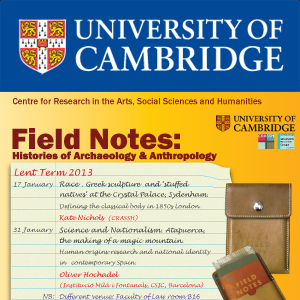Field Notes - 31 January 2013 - Science and Nationalism. Atapuerca, the Making of a Magic Mountain: Human-Origins-Research and National Identity in Contemporary Spain
Duration: 1 hour 53 mins
Share this media item:
Embed this media item:
Embed this media item:
About this item

| Description: |
Oliver Hochadel (Institució Milà i Fontanals, CSIC, Barcelona, Spain)
Discussant: Robert Foley (Leverhulme Professor of Human Evolution, University of Cambridge) Abstract In 1994 a Spanish research team found in the Sierra de Atapuerca in Northern Spain hominid fossils that turned out to be more than 780.000 years old, making them the oldest in Europe. Three years later the researchers named a new species: Homo antecessor. In 2002 Spanish historian Fernando García de Cortázar chose for his Historia de España the subtitle De Atapuerca al euro. How is it possible that within less than ten years Atapuerca turned from a practically unknown archeological site to the (however imaginary) starting point of Spanish history? I will argue that this did not happen “by itself”. The sheer age of the fossils was not enough. The numerous and intense efforts of the researchers themselves to popularize their findings were crucial. These efforts were taken up by the Spanish media as well as by museums and political actors and strongly enhanced. Numerous studies have shown how closely nation building goes hand in hand with research into human prehistory. Yet they mostly focus on the late 19th and the first half of the 20th century. The example of Atapuerca will show that the strong link between hominid fossils and national identity still exists in the 21st century. The paper will also try to show that there are different ways of appropriating prehistoric human remains. One may distinguish the concept of “biological continuity” in which the fossils represent some kind of ancestor from the concept of “scientific nationalism”. The latter consists in the pride in the scholarly achievement and international recognition of “our own” scientists. In Atapuerca – UNESCO- world heritage site since the year 2000 – we may even discern a third concept: the marketing of origins in order to lure tourists to the site: nationalism enterprised-up. |
|---|
| Created: | 2013-02-05 11:02 |
|---|---|
| Collection: | Field Notes Seminar |
| Publisher: | University of Cambridge |
| Copyright: | Glenn Jobson |
| Language: | eng (English) |
| Keywords: | Field Notes; CRASSH; |
| Abstract: | Oliver Hochadel (Institució Milà i Fontanals, CSIC, Barcelona, Spain)
Discussant: Robert Foley (Leverhulme Professor of Human Evolution, University of Cambridge) Abstract In 1994 a Spanish research team found in the Sierra de Atapuerca in Northern Spain hominid fossils that turned out to be more than 780.000 years old, making them the oldest in Europe. Three years later the researchers named a new species: Homo antecessor. In 2002 Spanish historian Fernando García de Cortázar chose for his Historia de España the subtitle De Atapuerca al euro. How is it possible that within less than ten years Atapuerca turned from a practically unknown archeological site to the (however imaginary) starting point of Spanish history? I will argue that this did not happen “by itself”. The sheer age of the fossils was not enough. The numerous and intense efforts of the researchers themselves to popularize their findings were crucial. These efforts were taken up by the Spanish media as well as by museums and political actors and strongly enhanced. Numerous studies have shown how closely nation building goes hand in hand with research into human prehistory. Yet they mostly focus on the late 19th and the first half of the 20th century. The example of Atapuerca will show that the strong link between hominid fossils and national identity still exists in the 21st century. The paper will also try to show that there are different ways of appropriating prehistoric human remains. One may distinguish the concept of “biological continuity” in which the fossils represent some kind of ancestor from the concept of “scientific nationalism”. The latter consists in the pride in the scholarly achievement and international recognition of “our own” scientists. In Atapuerca – UNESCO- world heritage site since the year 2000 – we may even discern a third concept: the marketing of origins in order to lure tourists to the site: nationalism enterprised-up. |
|---|---|

